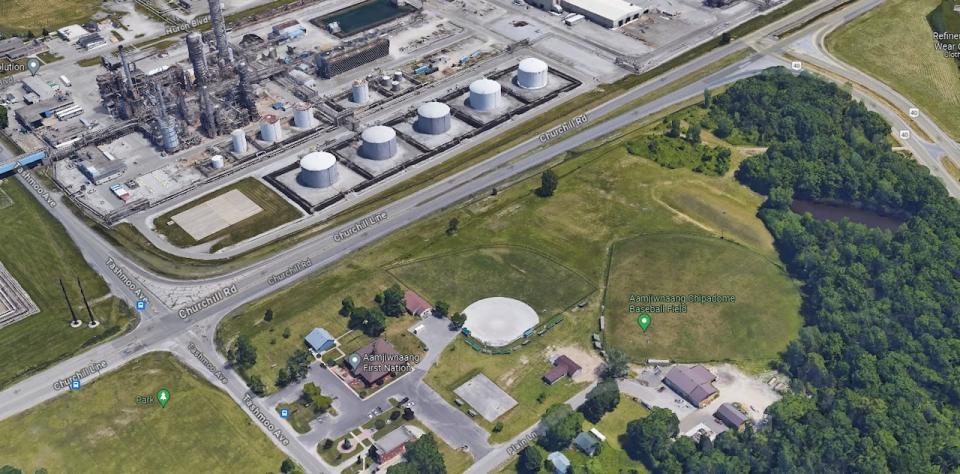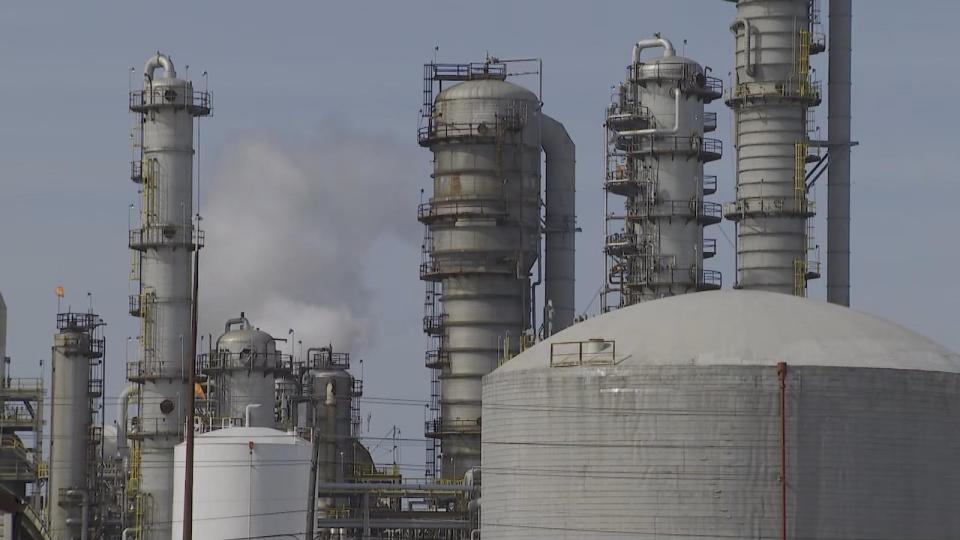Ontario plastics plant facing government orders to reduce toxic emissions will shut down permanently

A plastics plant in southwestern Ontario that was ordered by the province and federal government to reduce emissions of the cancer-causing chemical benzene now says it will permanently close by June 2026.
The Sarnia facility, which employs about 80 people directly, has been shut down since late April, after members of nearby Aamjiwnaang First Nation said they went to hospital and were treated for illnesses related to benzene exposure.
Orders from the provincial government drastically reduced the target for benzene emissions in May.
In a statement issued on Tuesday, INEOS Styrolution said its decision was "irrespective of the current situation."
"This difficult business decision to permanently close our Sarnia site was made following a lengthy evaluation process and is based on the economics of the facility within a wider industry context," said CEO Steve Harrington.
"The long-term prospects for the Sarnia site have worsened to the point that it is no longer an economically viable operating asset.
"The production site in Sarnia is currently shut down due to recent orders from regulatory authorities that forced us to declare force majeure. We are currently assessing what is required to restart the site — a process that could take approximately six months."
Councillor expects someone else will take over plant
Aamjiwnaang Coun. Darren Henry said the goal of the chief and council was not to get the plant shut down, but to get benzene emissions reduced.
"We're naturally relieved," said Henry.
"I think for our members, especially our children and our elders, that gives them, I guess a little more fresh air to breathe."

This aerial map shows INEOS Styrolution in the top left corner near band offices and sports fields. (Google Maps)
The INEOS facility is a key part of the Sarnia-Lambton petrochemical cluster that is the second largest of its kind in Canada.
Refineries in the area ship benzene to the plant through a pipeline system that INEOS processes into styrene which is used in plastic parts for the medical and automotive industries.

Darren Henry, an Aamjiwnaang First Nation band councillor, says the goal of the chief and council was not to get the plant shut down, but to get benzene emissions reduced. (Chris Ensing/CBC)
Henry believes the facility will eventually be purchased and operated by another company because of its value in the cluster.
He said chief and council will continue to hold whoever operates the facility to high standards.
"The scrutiny is there and for our community, we're prepared to follow this out."
LISTEN: Councillor Janelle Nahmabin of Aamjiwnaang First Nation joins Afternoon Drive
Lawyers for INEOS said in its appeal of the provincial orders that meeting the new standards would cost upwards of $30 million.
"The economic reality is that we have made significant investments in the Sarnia site for many years to ensure safe and reliable operations," said Harrington.
"Additional large investments that are unrelated to the potential costs of restarting operations would be necessary in the near future. Such investments would be economically impractical given today's challenging industry environment."
Closure will impact others in Sarnia chemical cluster: business group
In a statement, a spokesperson for Ontario's Ministry of Environment, Conservation and Parks said the ministry is aware of the announcement, "which the company attributes to long-term factors outside of the current situation."
"The ministry will continue to prioritize health and safety as the company determines their next steps."
Matthew Slotwinksi is the interim CEO of the Sarnia-Lambton Economic Partnership
He says the closure of INEOS is likely to have impacts that ripple across Sarnia's chemical industry.
"Certainly there's going to be job losses associated with that and that's something that we never want to see within the community, whether it's the full-time employees or the contractors associated with the site," he said.
"But there's also going to be impacts associated with the fact that there's so much interconnectivity amongst the cluster locally. The reality is the core products that were utilized within the Ineos Styrolution facility are many of the b-products or co-products associated with other facilities locally."
Slotwinksi says that since INEOS closed its doors in May, there have been impacts on facilities that would send their benzene to the facility and they'll have to find long-term solutions.

INEOS Styrolution's operation in Sarnia, Ont., is shown in a file photo. The CEO says it will shut down by June 2026 'following a lengthy evaluation process and is based on the economics of the facility.' The company was ordered by Ontario and Ottawa to reduce emissions of benzene. (CBC News)
Sarnia Mayor Mike Bradley says he feels for the people that will be affected in the plant's closure announcement.
"I'm sorry about the people that are now being impacted negatively [by] job loss, but the reality is this company could have chosen a different attitude and a different approach and they didn't do that."
He also said he believes there is "some gamesmanship" in the company's announcement.
Saying "'we're going to the nuclear option, which is shutting down, solve our problem.' But the reality is they had the option of appealing it, which they were starting to do, which was argue the science, this should not be a political discussion. This should be a science discussion about people's health."
But, he added, the story still has "a few more chapters to go."
"Where that ends up, I don't know. But I do want to help save the jobs, but I also want to protect people's health in the community, and those two are not separate."


